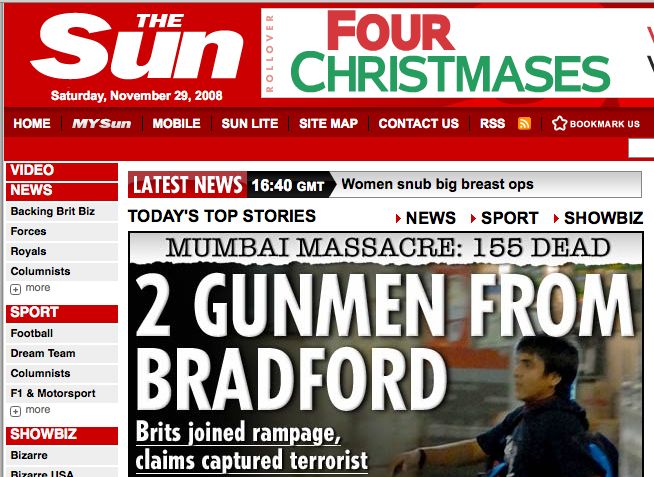If the BBC sets the agenda for the media, then the right-wing tabloids play the role of court provocateurs. The written word is traditionally more partial than television news in the UK. So the tabloids are still defined by the BBC, as they rail against it. This is the irony behind the talk of a ‘left-wing’ bias. Even still, Britain’s tabloids have become notorious for their news coverage.
The two biggest players, The Sun and the Daily Mail, are worthy of classic case studies. The Daily Mail is well known for its sensationalist headlines, and its ultra-conservative agenda.
By contrast, The Sun is known for its use of bad puns and its page three girls. In both cases, the content is deliberately shocking. Many of their rival papers – including the Daily Mirror, the only Labour red-top – seek to compete on this basis, always trying to outdo each other.
The tabloids build up a sub-narrative, which runs across the whole country, undermining progressive assumptions. It’s the reason there are people who believe the St. George Cross has been banned. It’s why people believe that Birmingham City Council has banned Christmas. You’ll hear terms like ‘human rights’ and ‘asylum seeker’ used as pejoratives. This is the British version of Fox News, and it has been far more insidious.
These narratives have a lot in common with the American right. It’s not a coincidence either. In the case of the ‘War on Christmas’ tales – whether it’s Winterval, or “seasons greetings” – the origin is Peter Brimelow, a British reactionary who moved to the US in the 1970s. He launched the idea that there was a secular assault on Christmas in the late 90s. This was in response to the use of “happy holidays” in Christmas cards.
It’s not a matter of stupidity. If anything it’s cynical gullibility. However, it’s also deeper than what individual readers think. It’s ideology. The stories of single-mums and benefits work because they are easily digestible anecdotes, which fit into a picture of the world. Why should I work if they get money for nothing? It’s ‘common-sense’. Ironically, this is why people who want ‘the facts’ will swallow entire falsehoods whole.
What has this achieved? The mass-media has made it harder to stand up and talk about equality and civil liberties, let alone anything radical. Firstly, you can barely open your mouth without decoding a whole series of assumptions. Secondly, the discussion has been depoliticised, while anxiety and hysteria has been ratcheted up. It’s very powerful, so powerful that the Left can barely communicate with people who are absorbed by this.
It’s also the case that the right-wing press has changed over time. It was once acceptable for tabloids to run pieces on AIDS and homosexuality, which would cause outrage today. The Mail ran a story in 1993 headed “Abortion hope after ‘gay genes’ finding”. At the height of the AIDS outbreak, The Sun went with the headline “US Gay Blood Kills Three in Britain”. This rancid level of coverage would not be repeated today.
The death of Stephen Gately proved this shift. Mail columnist Jan Moir provoked outrage with her description of the man’s fate as “unnatural”. On the other hand, it’s not as if The Daily Mail lost many readers over the controversy. If anything the paper may be poised to overtake The Sun in terms of sales. Even if queers are no longer fair game (a questionable proposition in itself), it’s still open season on immigrants and refugees.

Immigration is only ever talked about as a problem. We’re told ‘foreigners’ are stealing ‘our’ jobs and ‘our’ benefits at the same time. The press claims Syrian refugees are responsible for sexual assaults in Germany and terrorism in France. Then the press backs the bombing of Syria. At the same time, the Mail runs stories on paedophile rings of Asian men preying on ‘white’ girls. There was a time when such stories were unacceptable, but now they are mainstream.
In recent years, the press has surfed the wave of anti-Muslim sentiment. Any weapon will do. Suddenly, the same newspapers which run topless pictures discover women’s rights. We find The Sun and the Mail sporting headlines against halal slaughter on animal rights grounds. Even gay rights are now used by the right-wing press as a rod to bash the Muslim community. It’s funny how things change.
Not that this should surprise us, the tabloid press once flirted openly with Fascism. “I urge all British young men and women to study closely the progress of the Nazi regime in Germany,” Lord Rothermere, owner of the Mail, put it in 1933. “They must not be misled by the misrepresentations of its opponents.” The Daily Mail was not alone in this regard. People forget how appealing National Socialism was in its heyday.
The Mail’s ownership remains in the hands of the Rothermere family. This is aristocratic ownership, which may explain the paper’s affiliation with traditionalist conservatism. It’s the politics of the old gentry. In this regard, The Sun differs greatly, not just in style, but in class terms. Murdoch brushed aside the patrician wing of the media elite to take over The Sun, and the News Of The World, in 1969. He quickly cornered the shareholders and forced out the old bosses. This drew the ire of the old elites, but it worked.
Since then, Rupert Murdoch has become something of a demonic figure in the pantheon of the left, and with good reason. Murdoch has supported the winning candidate in many UK elections: Thatcher, Major, Blair and now Cameron. He even backed the SNP’s lightning victory in Scotland. Yet it may be a mistake to view the media baron as the puppet-master and the politicians as mere tools.
It wasn’t always this way. The Daily Herald was a social democratic newspaper, and it remained close to Labour even after it became The Sun, under Murdoch’s ownership. The paper supported Harold Wilson in the 1970 election, but shifted towards Ted Heath in 1974. On both occasions, the election was lost by the incumbent party. It was only in 1979 that Murdoch backed Margaret Thatcher, the first of many winners.
In return for his backing, the Thatcher government would disregard monopoly law to allow Murdoch to buy The Times and The Sunday Times. Murdoch backed Thatcher’s campaign to crush the miners, and she supported Murdoch against the print unions. The Sun would later withdraw support from the Conservatives just in time for the 1997 election. This was after Blair visited Murdoch in Australia. One wonders what was said.
According to Australian journalist Bruce Page, Rupert Murdoch whores out his publications as a propaganda service to governments. The price tag requests vast government favours, such as tax breaks, regulatory relief, monopoly markets and free rein with the print unions. So we find Murdoch’s media outlets tend to support those in power. Out of around 250 chief editors, not one opposed the 2003 invasion of Iraq.
Despite his self-image as an ‘outsider’, Rupert Murdoch is very much a part of the neoliberal establishment. His rise follows the transition away from social democracy in the 1970s. This is no coincidence. Murdoch’s presence can now be felt in the major sites of neoliberalism: the US and China. Murdoch follows power almost as much as he exercises it. This empire was built on salacious rags.
Screenshot and photograph courtesy of Joel Schalit.





